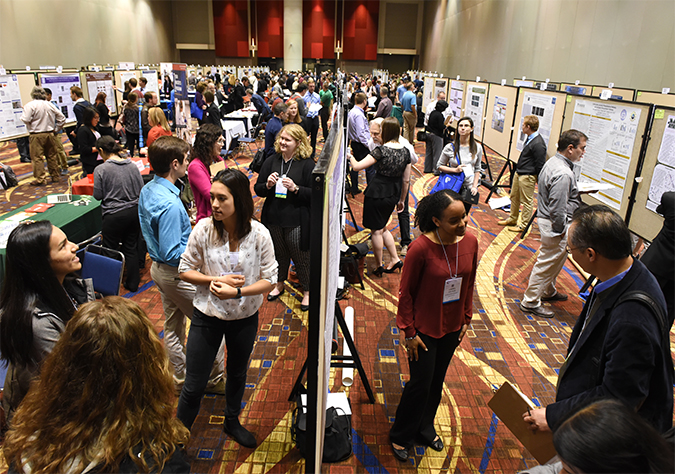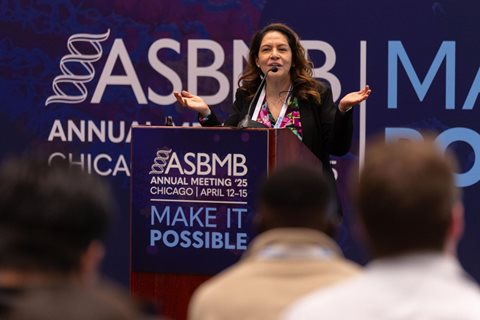Meeting abstract advice
It’s abstract season at the American Society for Biochemistry and Molecular Biology. We want you to share your exciting science at our 2019 annual meeting, and the first step to doing that is submitting your abstract.
 At the undergraduate poster competition at the 2017 ASBMB Annual Meeting in Chicago, Julia McCartney of North Central College presents her research on bacterial species that can be found on frog egg masses and inhibit pathogenic water molds. All Photos courtesy of ASBMB
At the undergraduate poster competition at the 2017 ASBMB Annual Meeting in Chicago, Julia McCartney of North Central College presents her research on bacterial species that can be found on frog egg masses and inhibit pathogenic water molds. All Photos courtesy of ASBMB
Abstract writing is hard. To get you motivated, seven members of the ASBMB Meetings Committee offer some advice on how to get your abstract noticed — and also what NOT to do when writing an abstract.
The deadline for abstract submissions is Nov. 14.
For details on submitting your abstract (and more advice), go to the Meetings page.
Daniel M. Raben, Johns Hopkins University School of Medicine
How to get your abstract noticed (in a good way):
Things that help are: (a) a “catchy” title that gives the reader a reason to want to read more — what is this abstract about and why is it exciting? (b) making sure the abstract is clear to a uninitiated reader; (c) clearly stating what was being tested/examined and the experimental approach focusing on KEY points; (d) explaining conclusions clearly, and finally (e) implications of the study in two to three sentences. Remember, there are a lot of abstracts, attracting attention, and making the abstract easy to understand will go a long way.
What to AVOID when writing your abstract:
Avoid jargon that only those in the field would know. Avoid overly complicated/detailed explanations/descriptions. Avoid parenthetical comments that detract from your point.
Sonia Flores, University of Colorado Anschutz Medical Campus
How to get your abstract noticed (in a good way):
You want to have a title that tells the story and a compelling conclusion.
What to AVOID when writing your abstract:
Avoid repetition and descriptive sentences.
Patrick Grant, University of Virginia
How to get your abstract noticed (in a good way):
Clearly demonstrate the scientific problem, providing a hypothesis or objective up front. Finish with the impact that your work has on your field. Provide an overview of the approach and key results in a summary form, but also highlight what is distinctive about your methods and/or results.
What to AVOID when writing your abstract:
Avoid being over technical in the description of your work, as you would like your abstract to be understood by a broad audience. Also check for grammatical and typographical errors.
Y. Jessie Zhang, University of Texas, Austin
How to your abstract noticed (in a good way):
You want your audience to understand the significance right away. In the first two sentences, set the stage for the field and the key question in the field you are trying to address. Also, summarize in the last sentence how your research impacts the field.
What to AVOID when writing your abstract:
Use a minimalist strategy to describe the results of your research. This is only supposed to be a movie preview, so no experimental details. Young scientists present their research at the undergraduate poster competition at the 2017 ASBMB Annual Meeting in Chicago.
Young scientists present their research at the undergraduate poster competition at the 2017 ASBMB Annual Meeting in Chicago.
Evette Radisky, Mayo Clinic
How to get your abstract noticed (in a good way):
Lay the foundation: start with a clear, concise sentence or two that lays out background (only the most essential) and conveys your problem/question and its significance to a broad audience. Then include some specifics about general methodology/approach and your results so far. Conclude with a summary sentence that may extrapolate to the broader implications or future directions of your main finding.
What to AVOID when writing your abstract:
Avoid undefined acronyms. Avoid too many numbers; even if your study is very quantitative in nature, your abstract may appeal to a broader audience by describing your key findings in a more qualitative fashion.
Enrique M. De La Cruz, Yale University
How to get your abstract noticed (in a good way):
Try to have a title with a conclusion (e.g. "Membrane Protein X is a voltage-gated water channel" rather than "Characterization of...."). Readers will walk away learning something, even if they read only the title.
What to AVOID when writing your abstract:
Avoid too much detail. This can be found on the poster and/or paper, so communicate general behaviors, observations, etc.
Kelly G. Ten Hagen, National Institutes of Health
How to get your abstract noticed (in a good way):
Clearly convey why your study is relevant/noteworthy by tailoring background information to your audience (more general for more diverse groups and a bit more detailed for specialized groups). Clearly state the question being asked/problem being investigated. After stating the results and conclusions, circle back to a bigger picture perspective.
What to AVOID when writing your abstract:
Avoid jargon and unnecessary details.
Lan Huang, University of California, Irvine
How to get your abstract noticed (in a good way):
1. Make a concise and eye-catching title.
2. Emphasize the significance and novelty of the work.
3. Describe main discovery clearly that is important to the field.
What to AVOID when writing your abstract:
Try not to just have research background in the abstract.
Enjoy reading ASBMB Today?
Become a member to receive the print edition four times a year and the digital edition monthly.
Learn moreFeatured jobs
from the ASBMB career center
Get the latest from ASBMB Today
Enter your email address, and we’ll send you a weekly email with recent articles, interviews and more.
Latest in Careers
Careers highlights or most popular articles

Mapping proteins, one side chain at a time
Roland Dunbrack Jr. will receive the ASBMB DeLano Award for Computational Biosciences at the ASBMB Annual Meeting, March 7–10, just outside of Washington, D.C.

Exploring the link between lipids and longevity
Meng Wang will present her work on metabolism and aging at the ASBMB Annual Meeting, March 7-10, just outside of Washington, D.C.

Upcoming opportunities
Calling all biochemistry and molecular biology educators! Share your teaching experiences and insights in ASBMB Today’s essay series. Submit your essay or pitch by Jan. 15, 2026.

Defining a ‘crucial gatekeeper’ of lipid metabolism
George Carman receives the Herbert Tabor Research Award at the ASBMB Annual Meeting, March 7–10, just outside of Washington, D.C.

Building the blueprint to block HIV
Wesley Sundquist will present his work on the HIV capsid and revolutionary drug, Lenacapavir, at the ASBMB Annual Meeting, March 7–10, in Maryland.

Upcoming opportunities
Present your research alongside other outstanding scientists. The #ASBMB26 late-breaking abstract deadline is Jan. 15.
